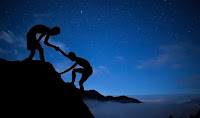Netflix dramas 'D.P.' and 'Squid Game' are very popular these days. 'DP' is the story of the military police in pursuit of deserters who have escaped from military service, while 'Squid Game' is about people suffering from huge debt or needing a lot of money right away. The content of betting and playing a game for survival. People risk their lives to win a large sum of money.
As the hot response continues not only in Korea but also around the world, articles are pouring out proud of the power of our cultural content, but the columnist in the Eyes of the Believer of the Catholic Times was ashamed and heartbroken to see the shadows of Korean society vividly reproduced by these dramas. She is the director of a Theological Research Institute.
The two dramas expose how hierarchical and unequal Korean society is, and sharply denounce the absurd reality that violence inflicted on the weak by the strong is regarded as someone's 'fun' or an unavoidable 'world order'. It's even more terrifying considering that these dramas are based on real events rather than just fiction. 'D.P.' has the incident in 2014 where soldiers were involved in the bullying death of a junior soldier. It provides a glimpse into what Korean men who are obligated to serve in a divided country experience in the military. Contrary to the saying, "A man needs to go to the military to become a man," this is often true and one may experience growth in life. However, this drama depicts the experiences of destroying humanity in the military, where they adapt to such violence and oppression, ignore someone's suffering, and internalize violence.
The protagonist of 'Squid Game' is modeled after a laid-off worker at Ssangyong Motor, on strike for 77 days in 2009 in protest against large-scale layoffs. It shows how the life of a diligent family head fell apart after losing his job, the trauma left by the violent suppression by police, and reminds us of the successive deaths of Ssangyong Motor's laid-off workers and their families.
In 'D.P.', people who are soft and gentle-hearted who do not fit into the military organization that demands toughness, and the poor who can’t help anyone even when faced with injustice, become victims of serious human rights violations and violence. In the 'squid game,' where one lives by killing someone, powerless old people, women, and migrant workers are dismissed as useless beings. Those who have a lot of power, and property ridicule and use violence against the weak and lose their humanity due to moral insensitivity. This is what Korean society looks like today in these dramas.
Amid the 'culture of death' society that is destroying humanity, Korea has suffered the disgrace of being a 'suicide republic' with the world's highest suicide rate among OECD countries for the third year in a row. According to a report released by the National Statistical Office recently, an average of 36.1 people committed suicide per day over the past year, and 54.4% of those in their 20s died by suicide. As the strong social distancing situation continues due to the pandemic, an increasing number of self-employed and small business owners are making extreme choices that can no longer be tolerated. An acquaintance asked me, "As suicides are increasing like this, is there anything the Catholic Church in Korea is doing to approach or help these people in their difficulties?" She couldn't come up with an answer right away.
There are churches in all regions, but the reality that those who are in the midst of a crisis cannot go to churches to ask for help makes us look back on whether our proclamation of the gospel is being carried out properly. The Latin noun 'salus', meaning 'salvation, also contains meanings such as health, well-being, peace, and life. Proclaiming the gospel of salvation goes beyond the invitation to be baptized and become believers, and it is the mission of Christians to take the lead so that all people in the world can live in health and peace in body and mind, and live with human dignity and full life as God's creatures. Is it not?






